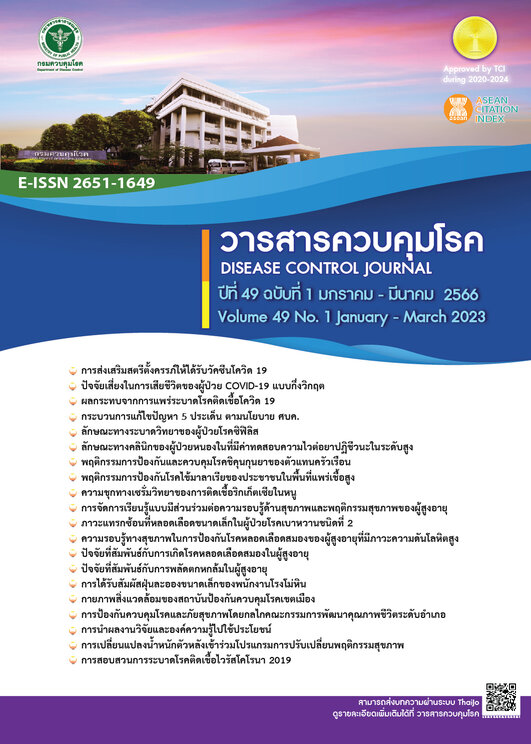An analysis of physical environment of the Institute for Urban Disease Control and Prevention for sustainable development
DOI:
https://doi.org/10.14456/dcj.2023.16Keywords:
physical environment, masterplan, sustainable development, learning center for urban disease control and preventionAbstract
A study of physical environment of the Institute of Urban Disease Prevention and Control was conducted by the institute scholars and college researchers in accordance with the institute’s policy to maintain architectural value of historical building aged over 80 years old. This research aims to study physical environment and spatial context of the institute which leads to propose a conservative guidance for target area development. Data were collected from related literature, cadastral survey, questionnaires, and focus groups. The analysis was performed by sieve mapping technique based on 6 indicators as follows: 1) building performance, 2) land use, 3) transportation, 4) water treatment, 5) garbage management, and 6) safety. The results revealed that the average mean of overall factors reaches a particularly low level at 1.65 from 5. It was found that the most challenging problem is water treatment (0.00) followed by building performance (1.00), land use (1.00), garbage management (2.00), transportation (3.00), and safety (3.00). As a result, a well-designed guidance is required to solve the problems which could potentially lead to sustainable development.
Downloads
References
Institute for Urban Disease Control and Prevention. Open house. Bangkok: Institute for Urban Disease Control and Prevention; 2017. (in Thai)
Pechanon Y. 84 years of urban disease control and prevention work. Bangkok: Institute for Urban Disease Control and Prevention; 1990. (in Thai)
Fouberg EH, De Blij JH, Murphy BA. Human geography: people, place, and culture. 10th ed. Hoboken: Wiley; 2012.
Merriam-Webster Dictionary [Internet]. Urban Sprawl; [cited 2022 Jan 25]. Available from: https://www.merriam-webster.com/dictionary/urban%20sprawl
World Commission on Environment and Development. Our common future: report of the World Commission on Environment and Development [Internet]. 1987 [cited 2022 Mar 5]. Available from: http://sustainabledevelopment.un.org/content/documents/5987our-common-future.pdf
Digital Economy Promotion Agency (DEPA). Smart city Thailand [Internet]. 2022 [cited 2022 Mar 22]. Available from: https://depa.or.th/th/smart-city-plan (in Thai)
Meijer A, Bolívar RPM. Governing the smart city: a review of the literature on smart urban governance. Int Rev Adm Sci. 2016;82:392–408.
Glasmeier A, Christopherson S. Thinking about smart cities. Cambridge J Reg Econ Soc. 2015;8:3-12.
Pechpakdee P. Urban studies and paradigm of urban knowledge. Politics Gov. 2016;6(2):12-35. (in Thai)
Deming WE. The history and evolution of the PDSA cycle [Internet]. 2015 [cited 2022 Mar 29]. Available from: https://deming.org/the-history-and-evolution-of-the-pdsa-cycle
Ministry of Interior (TH). Ministerial Regulation. No.55 Issued pursuant to the Building Control Act 1979 [Internet]. 1979 [cited 2022 Mar 7]. Available from: https://asa.or.th/laws-and-regulations/cba/ (in Thai)
Bangkok Metropolitan Administration. The Bangkok code of law regarding buildings control 2001 [Internet]. 2001 [cited 2022 Mar 21]. Available from: https://download.asa.or.th/03medis/04law/cba/bb/bb44-03.pdf (in Thai)
World Health Organization. Urban green space interventions and health: a review of impacts and effectiveness [Internet]. 2017 [cited 2022 Feb 12]. Available from: https://www.euro.who.int/__data/assets/pdf_file/0010/337690/FULL-REPORT-for-LLP.pdf
Khammeng T. Sufficiency economy applications of the upper Northeastern famers in agricultural new theory system. Khon Kaen: Department of Animal Science, Khon Kaen University; 2008.
Downloads
Published
How to Cite
Issue
Section
License
Copyright (c) 2023 Disease Control Journal

This work is licensed under a Creative Commons Attribution-NonCommercial-NoDerivatives 4.0 International License.
Articles published in the Disease Control Journal are considered as academic work, research or analysis of the personal opinion of the authors, not the opinion of the Thailand Department of Disease Control or editorial team. The authors must be responsible for their articles.






